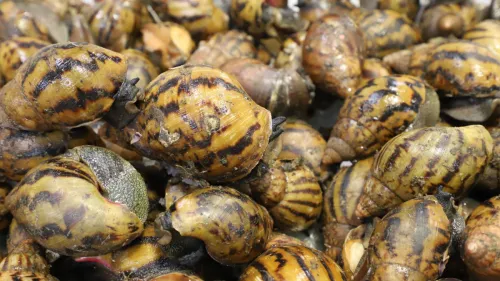ROMULUS, Mich. – U.S. Customs and Border Protection’s (CBP) Office of Field Operations intercepted 90 Giant African Land Snails at Detroit Metropolitan Airport, June 30.
The cache of live snails was discovered after a passenger arriving from Ghana was referred for a secondary examination after declaring various fresh food items.
During the baggage inspection, a tied, woven bag with an odd odor caught the attention of agriculture specialists. Inside the bag were Giant African Land Snails ranging from 3 to 6 inches in length. Prior to the luggage being opened, the passenger began declaring other prohibited items, such as beef skin and fresh peppers, but there was no mention of the snails, which are considered an invasive species in the U.S.
The snails were subsequently seized.
“These snails are an invasive species that could negatively impact our economy,” said Acting Port Director John Nowak. “Our agriculture specialists are always keeping a watchful eye out for harmful plants, animals and insects.”
While these Giant African Land Snails were intended for consumption, they have a voracious appetite and cause major crop damage when they escape into the environment. They can also pose a public health threat to humans. The snails can grow up to 8 inches and feed on a wide variety of plants, including many economically important crop plants, and cause structural damage by using stucco on houses to meet their calcium requirement for shell growth.
Travelers are encouraged to learn more about current regulations before attempting to bring food items into the United States to avoid penalties, seizures, and even arrest.
Follow us on X (formerly known as Twitter) @DFODetroit and @CBPGreatLakes.



